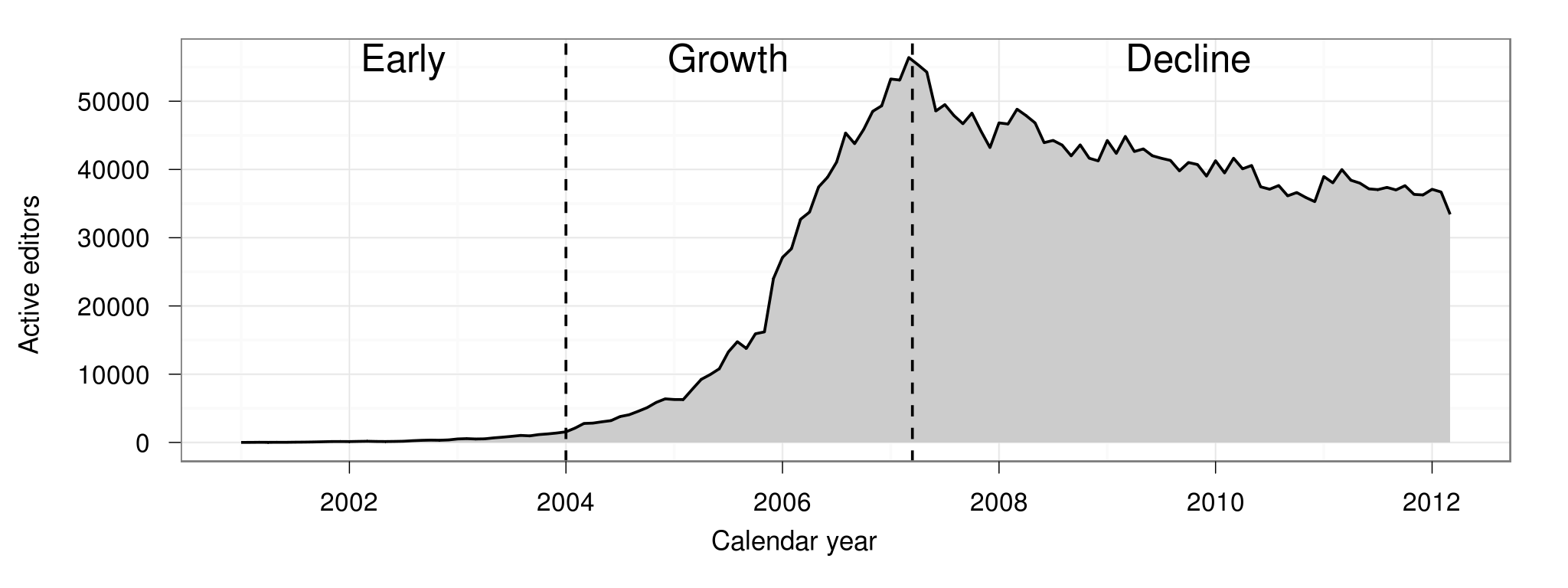Wikipedia is the 6th most sued website in the world. A recent report finds that its volunteer workforce is shrinking, threatening the site’s ambition to “compile the sum of all human knowledge.”
According to a report in the MIT Technology Review the volunteer workforce that edits and polices the content on Wikipedia has gone down by a third since 2007.
In response, the Wikipedia Foundation, which manages the site as a non-profit organization, is working on changes to the software infrastructure and processes to encourage new volunteer editors, create greater diversity among the mostly male volunteers, and broaden the subject coverage, which tends to be focused in very specific silos of knowledge.

Source: The Rise and Decline of an Open Collaboration Community: How Wikipedia’s reaction to sudden popularity is causing its decline by Aaron Halfaker, R. Stuart Geiger, Jonathan Morgan, and John Riedl.
There is evidence, as expressed in the study above, that established Wikipedia volunteers, whether by virtue of the policies in place or through attrition, have made it difficult for new editors to enter the inner circle.
Wikipedia is highly reliant on the notion of collaboration by the community. Now, it must adapt its policies to reinvigorate collaboration and bring new blood into the system. If it doesn’t, it risks its relevance and efficacy.
David Mikics, Professor of English at the University of Houston has written a nice piece that also criticizes the very notion of Wikipedia as a useful source of knowledge, perhaps also an artifact of its clique of opinionated editors who hold the keys to the kingdon:
The worst effect of the Internet is its consequences for student writing. These days student papers often have a patchwork character: here and there a few camouflaged sentences lifted from Wikipedia, seasoned with SparkNotes. Most of the concern about the Internet’s effect on writing focuses on plagiarism, but the problem is a far wider one. It’s true that plagiarism, always a popular student sport, has enjoyed a renaissance in the last decade. It’s the unusual student that can resist being able to steal a text simply by cutting and pasting. All you have to do is figure out how to alter it so that it can pass the Turnitin plagiarism detector. (There must be an app for that—I don’t want to know.) But even when students don’t plagiarize, the damage has been done. They knuckle under to the dull, one-size-fits-all version of knowledge that is embodied, more than anywhere else, in Wikipedia.
This is where the conformity and soullessness of Wikipedia becomes sadly apparent. Its lumps of facts have been licked into shape by a thousand anonymous tongues, draining them of any vestige of personality. Any critic—from the the most wet-behind-the-ears freshman to Northrop Frye—needs a personal style, and she or he will never get it from reading Wikipedia’s crowdsourced pages. For a refreshing contrast to the mass-produced Wikipedia, leaf through the eleventh edition of the Encyclopedia Britannica, and you’ll read genuine mini-essays, written by actual people. The authors of the Britannica knew how to express themselves, and they cultivated a sense of style; they had read Ruskin and Macaulay and Gibbon.
Nowadays we call what Wikipedia does crowdsourcing. It’s a great buzzword, but could this be the beginning of the decline of this kind of knowledge gathering. Increasingly, we may be happier to see our content curated and for their to be more barriers to entry based on ability and talent, and not just a set of processes that seem to be easy to hijack by those who, perhaps, shouldn’t be guarding the entrance.






